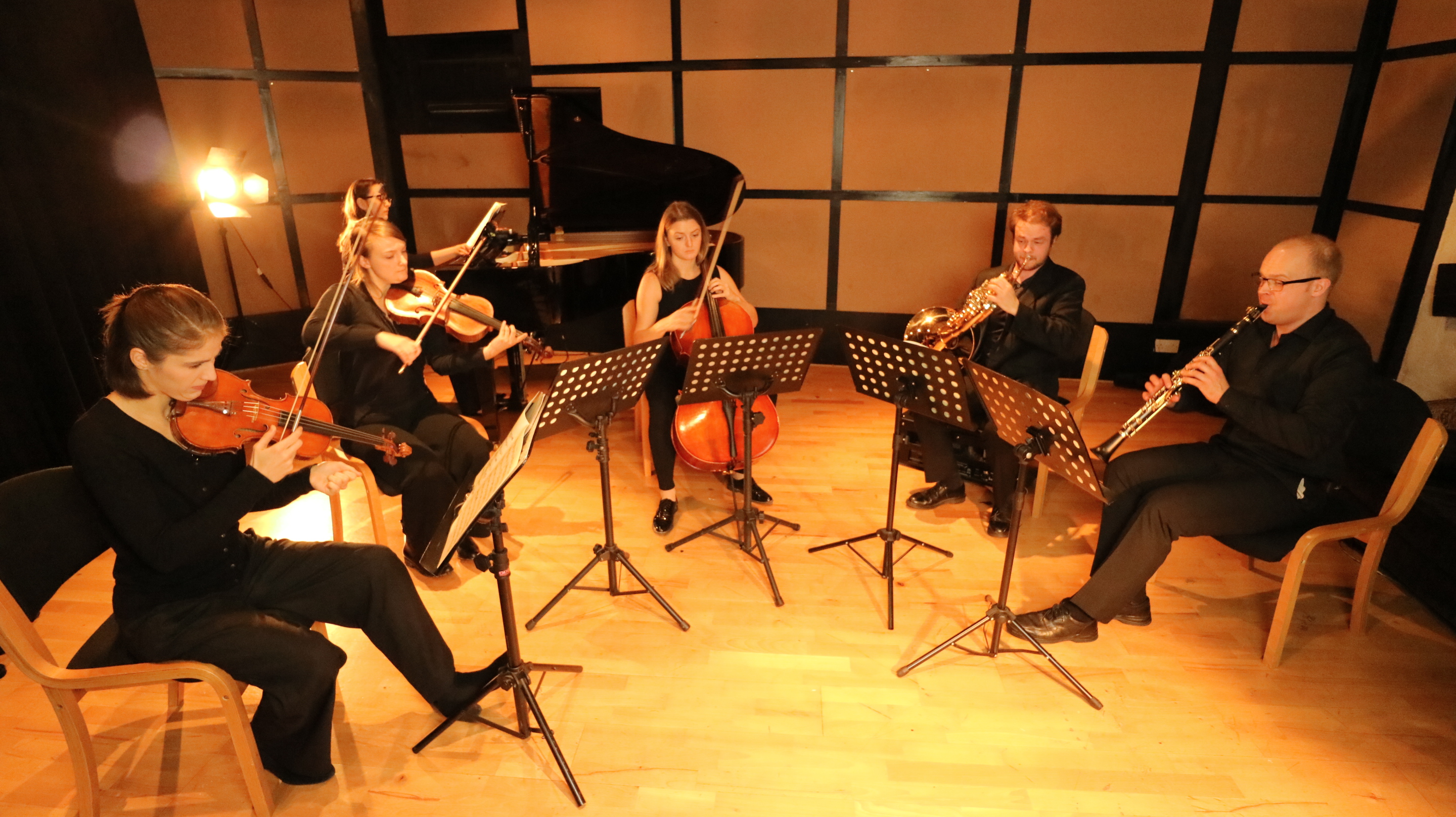Clarinet & Piano Sextet
Clarinet / 2 Violins / Viola / Cello / Piano
A fun combination, the Clarinet/String Quartet/Piano Sextet enables programming of the whole range of Clarinet/Piano Quintets, Quartets and Trios along with a range of original Sextet works. Blending the sound of a full string quartet with piano and the vocal qualities of the clarinet, it begins to provide a small orchestral texture; with a vast possibility of instrumental colours and textures.
It is home to Prokofiev’s ever popular ‘Overture on Hebrew Themes’. Commissioned by the Jewish ensemble Zimro, the group consisted of a string quartet, clarinettist and pianist; with a repertoire based on Jewish music, using various combinations of their players. Various accounts conflict on who approached who first, but it is likely Prokofiev heard them at Carnegie Hall during their American tour; after which they provided him with a notebook of Jewish melodies and he began writing the group’s first sextet. Hesitant at first as he preferred to write his own melodic material, Prokofiev ‘kept [the book] and one evening... chose a couple of nice melodies from it and began to improvise on them on the piano’. While he didn’t place much importance on it at the time, the work became a great success and remains in the repertoire to this day. The work of the Zimro Ensemble and Prokofiev inspired many composers to write Jewish music for the group (including Joseph Achron, Grigori Krejin, Julius Chajes and Mitya Stillman) and it became a popular Jewish band instrumentation.
Other works also exist however; after Aaron Copland’s original Short Symphony (1933) proved too difficult for conductors and players of the time, he arranged the work in this wonderful version for Sextet. Full of his typical charged energy, rhythmic snap and constantly changing meters, combined with meditative lyricism and wide melodic leaps, the work is highly effective and quintessentially American/Copland! Among others, German international clarinettist/composer Jörg Widmann’s ‘Fever Fantasy’ is a gripping example of modern chamber music for the sextet; combining extended instrumental techniques/effects with historical forms/structures to create a superbly crafted yet alien sound world.
Clarinet, Horn & Piano Sextet
Clarinet / Horn / Violin / Viola / Cello / Piano

A hidden gem among chamber mediums, the Clarinet/Horn/String Trio/Piano Sextet is a masterful combination; again verging on a small orchestral texture while all playing together, but maintaining intimacy with its solo instruments and vast array of instrumental combinations, colours and textures. Easily the most popular work is renowned Hungarian composer/pianist/conductor Ernő Dohnányi’s Sextet in C, Op.37. Also known as Ernst von Dohnányi, he was grandfather to Christoph von Dohnányi; one of the greatest conductors of our time. Heavily influenced by Brahms and Liszt, Dohnányi’s sextet was one of his last major chamber works and demonstrates his hilarious brilliance in musical ‘goulash’; blending multiple styles and influences into one cohesive work. Rarely performed due to the combination, the work and medium deserve much wider attention and recognition.
While Dohnányi arguably established the medium, it was not without precedent. Anton Eberl (first rank pianist of his time as well as composer) composed a delightful sextet- the first work on record for the combination. As a pupil of Mozart, Eberl’s works were frequently passed off by publishers as that of Mozart himself. While Mozart didn’t mind and Eberl was too timid to combat this during Mozart’s life, it is a strong indicator of the regard held for Eberl in his time and the quality of his work.
Among more modern works for the medium include that of German composer/violist Volker David Kirchner, prolific French composer Nicolas Bacri and in particular master Polish composer/conductor Krzysztof Penderecki’s Sextet. One of his most substantial chamber works to date, it is a grippingly powerful work; from an earth pounding, rhythmically charged first movement to a quieter, hauntingly dark yet beautiful second movement. Echoing sound worlds of Stravinsky, Bartok, Hindemith and Shostakovich, it makes inspired use of the instrumental textures available to the medium; surely one of the masterpieces of the 20th/21st century.
© 2016 Ensemble Mirage | Login
